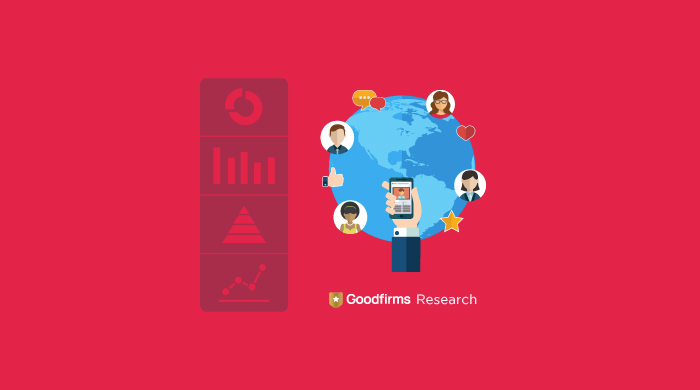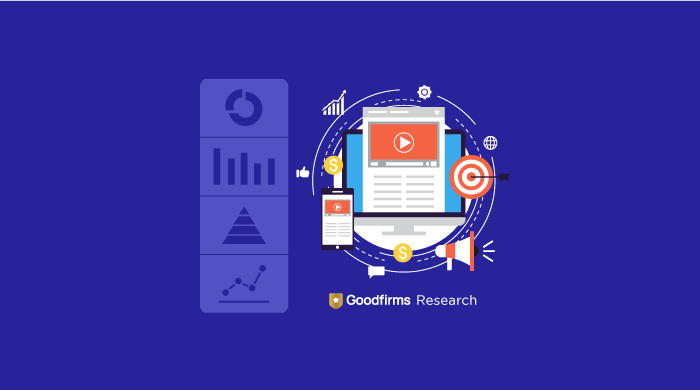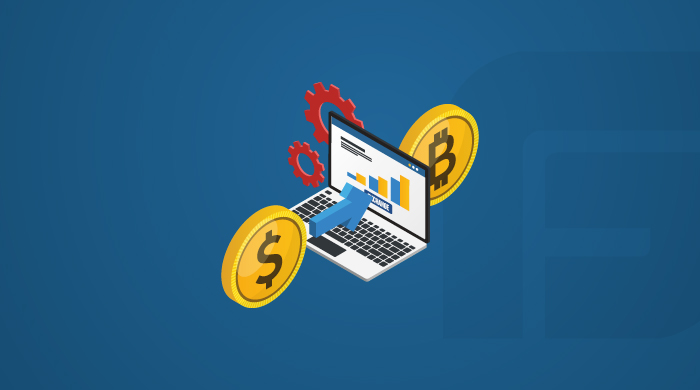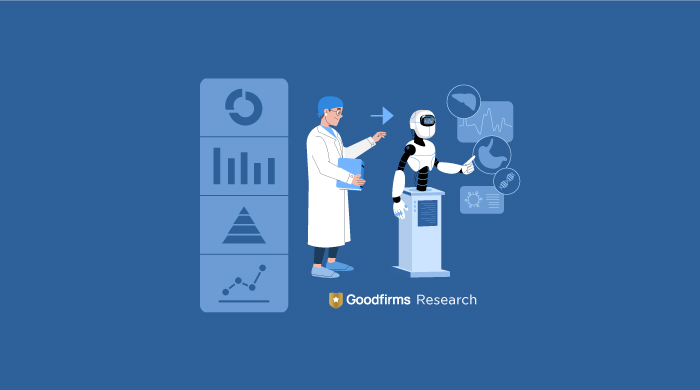ABSTRACT:
Enterprise Resource Planning (ERP) software solutions unify diverse business operations and procedures into a single, streamlined system, facilitating increased productivity, greater decision-making ability, simplified business procedures, and better data visibility. Undoubtedly, Enterprise Resource Planning solutions have seen evolutions ever since they came into existence. The prevalence of cloud-based ERP solutions, accessibility on mobile devices, and integration of the latest technologies like artificial intelligence, IoT and machine learning are the key drivers of this market.
The varied requirements of businesses to manage several day-to-day activities smoothly have resulted in various ERP software providers bringing in novel options for businesses to choose from.
Users ranging from startups to large enterprises are opting to invest in the next generation of AI-based ERP solutions to streamline their business processes like human resources, finance, supply chain, manufacturing, and many more.
However, implementing and maintaining an ERP system comes with a few set-back. Companies can face challenges such as data migration, budget constraints, complicated customization, and difficulty in integrating into the existing systems. But, the pros of the systems can outweigh the cons, resulting in better ROI for businesses. Currently, the ERP market is seeing a high adoption rate across several industries.
Goodfirms’ survey ‘Enterprise Resource Planning - Market, Trends, and Future Scope’ attempts to draw valuable insights from business executives and IT professionals from various industries that can enrich the understanding of Enterprise Resource Planning software, its implementations, and issues while implementing the system and its potential role in business operations in today's world.
Table of Contents:
- Increased Productivity
- Centralized Data
- Saves Time
- Reduces Operational Costs
- Accurate Analytics
- Transparency in Data
- Enhanced Customer Satisfaction
- Better Real-time Reporting
- Improved Scalability
Challenges When Implementing ERP
- Choosing the Right Vendor
- Hidden Costs
- Data Migration Issues
- Inadequate Testing
- Maintenance Costs
- Technical Complications
- Appropriate Training
Factors to Consider When Choosing the ERP Software
- Features
- Possible Integrations
- Pricing
- Adaptability of the Employees
- Customizations
- Scalability
- Flexibility
- Vendor Support
- Implementation Timeline
Introduction
With digitization taking the upper hand, more and more businesses are keen to streamline their operations and follow efficient work practices. Enterprise Resource Planning software (ERP) offers great assistance in achieving a streamlined and efficient work model for almost any business.
With the ability to bring several business processes on the same page, ERP software can help in improving transparency in the business workflow. With better coordination, these software solutions can aid in insightful decision-making across various departments.
The integration of technologies like artificial intelligence with ERP can further enhance the performance of the tool, thereby increasing the benefits to organizations. Although the usage of the software comes with its own set of challenges, continuous improvements and technological advancements suggest a great future for the ERP software industry.
Goodfirms’ survey ‘Enterprise Resource Planning: Market, Trends, and Future Scope’ gives an overview of the ERP software industry. The survey aims to analyze the market share of the industry and current trends in the industry. The survey also attempts to predict the future scope of the industry.
Overview of ERP
Enterprise Resource Planning tools has been driving the functional excellence of organizations of all sizes, escalating their efficiency in handling human resources, CRM, finance, and other key operational processes and allowing them to progress toward sustainable growth, profits, and business success.
Enterprise Resource Planning systems have a lot to offer to organizations, and businesses have been trying to reap maximum benefits from the system. With proven advantages to the industries, the ERP market has been exploding consistently.
What is ERP?
Enterprise Resource Planning(ERP) refers to the system that integrates day-to-day business processes while streamlining the workflows for the efficient functioning of the business. Enterprise Resource Planning software for businesses can help employees from various departments access reliable and accurate information to complete their routine tasks efficiently.
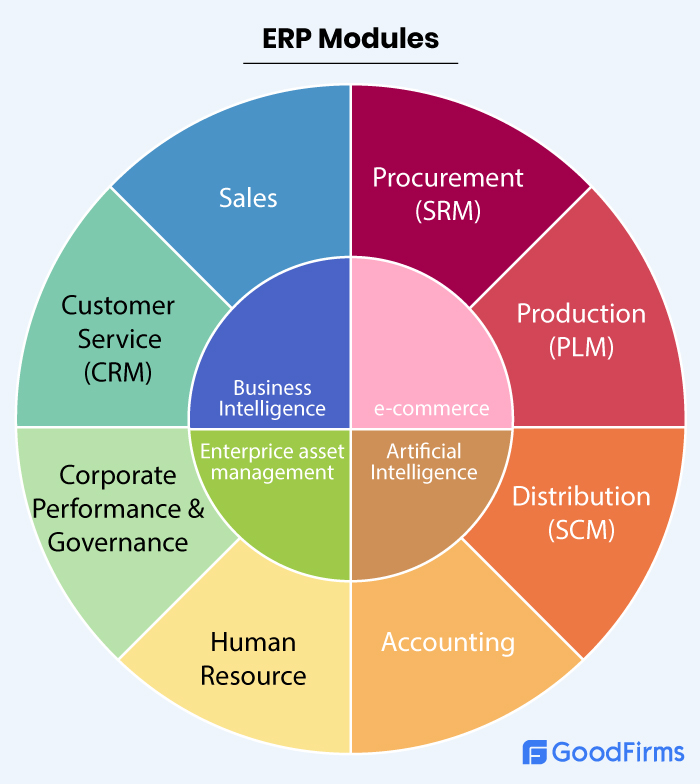
Primarily designed for manufacturing industries, ERP solutions are now available for almost all industries. ERP solutions are engineered to automate mundane tasks to enhance decision-making with accurate information. Access to accurate data in real-time assists companies to make more informed decisions and precise forecasts.
History of ERP
The existence of ERP can be traced back to the 1960s when the systems were termed Material Requirements Planning(MRP). These systems primarily facilitated the accurate calculation of the material requirements, the received and despatched time, quantity, and price. The MRP systems basically worked for manufacturing industries.
With time and sophistication, these systems were capable of producing detailed information like capacity planning, shop floor control, scheduling, and other related calculations. The MRP systems were then named MRP (Manufacturing resource planning II) back in 1980.
With technological advancements and evolution, the MRP systems were re-designed to include departments like Accounting, Finance, Sales, and Human Resources, going beyond the basic Inventory control and manufacturing processes. The Gartner Group was the earlier one to include the other functionalities of the then MRP systems and the term ERP(Enterprise Resource Planning) evolved in 1990.(1)
With the introduction of Cloud ERP by Netsuite in the year 1998, the ERP industry saw a new era that further led to the shift from on-premise ERP to cloud-based ERP systems.(2)
ERP has taken multiple functions within its wing in this couple of decades, and the market is seeing phenomenal growth with more businesses adopting the same.
Market Size and Key Players
The global Enterprise Resource Planning market is expected to reach USD 123.42 Billion by 2030 with a CAGR of 11.1%.
With North America being the highest contributor to the market, cloud deployment is expected to witness more implementations as compared to on-premise ERP implementations.(3)
There are several key players in the ERP software market, which include SAP SE, Oracle Corporation, Microsoft Corporation, IBM Corporation, Sage Group plc, Infor, Deltec, Epicor, Acumatica, Inc., and Workday Inc., to name a few.
Survey and Data Analysis:
Goodfirms’ survey titled “Enterprise Resource Planning: Market, Trend, and Future Scope,” conducted in June 2023, gives an idea about the Enterprise Resource Planning Market and the benefits of implementing ERP systems for businesses. The survey also collates data about the challenges faced by organizations while implementing the system and current trends in the industry.
The survey queried 685 businesses, of which 49% of respondents were large businesses and 23% were medium-scale businesses. Around 20% of the survey participants were small businesses, whereas 8% were startups.
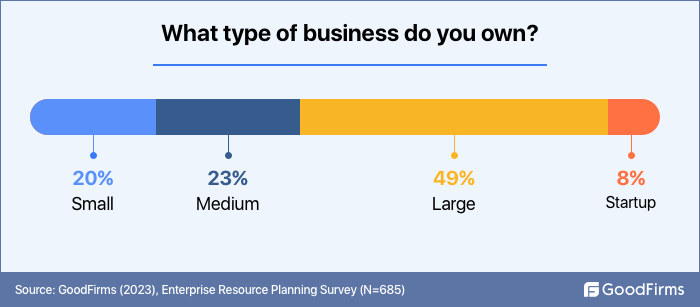
Around 60% of the Surveyed Businesses have Already Implemented an ERP System
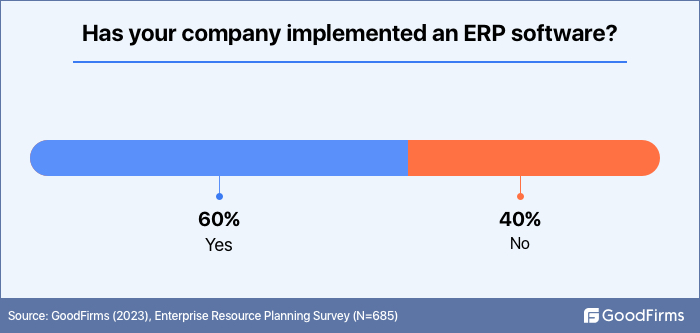
The implementation rate of ERP systems has been constantly rising. Owing to the several benefits that businesses have been leveraging and the availability of resources, more organizations are going for an ERP system to streamline their processes.
While 60% of the surveyed businesses have implemented an ERP system, about 40% of businesses are still unsure about the implementation of an ERP system for their organizations.
Customer Relationship Management is the Most Important ERP Module for 83% of Businesses
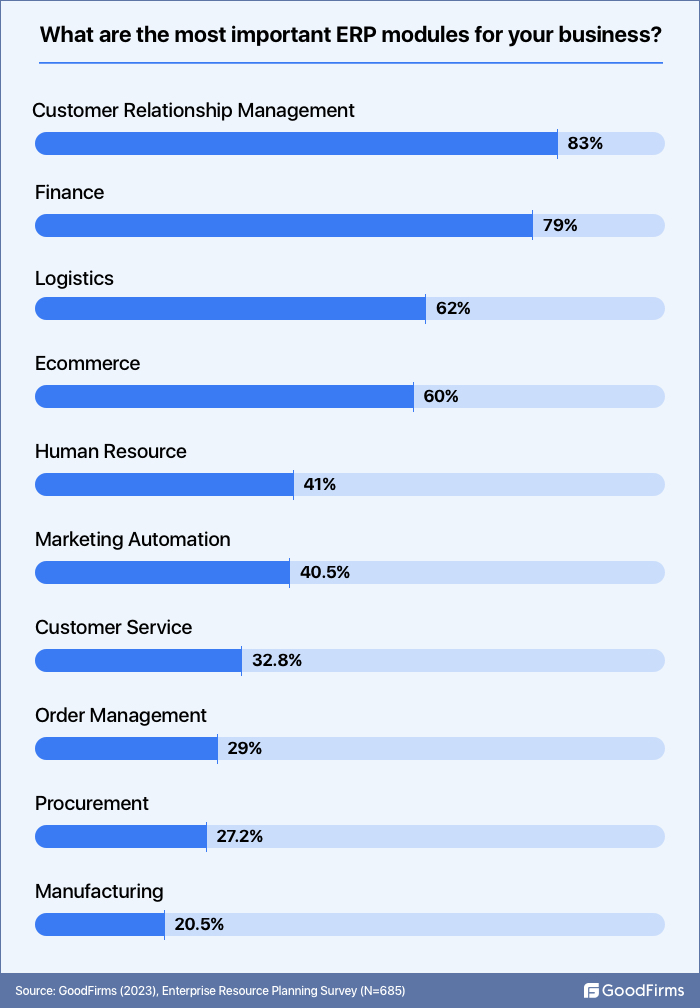
ERP systems come in a modular design that allows businesses to implement ERP software that fits their needs. Every ERP module has a specific function, and businesses can choose modules based on their approach toward a specific business process. It is advisable that businesses consider opting for ERP systems from reputed and well-established providers to facilitate the addition of modules in the future.
The customer relationship management (CRM) module of the ERP helps manage customer data. Businesses use the CRM module to store the prospect information of their customers right from their communication details. This module is also responsible for managing sales leads and tracking the consumer cycle.
The financial management module is one of the most crucial ERP modules. It is used by businesses to track the accounts payable and accounts receivable and manage the general ledger. The finance module is an important module for around 79% of businesses that were queried.
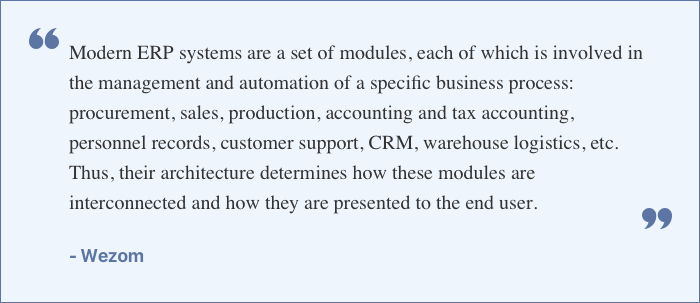
The logistics module is associated with the movement of goods and delivering the shipments to the consumers. Flawless movement of goods is critical for customer satisfaction and management of the inventory. The logistics module is, therefore, one of the most important modules for 62% of the survey participants. The proper use of the logistics module in the ERP ensures the delivery of shipments in the least time possible.
The ecommerce module is critical to nearly 60% of surveyees. The growing popularity of ecommerce has led to the growth in the adoption of this module. The ecommerce module helps a business launch a B2B or B2C ecommerce website with ease. It provides easy access for the company employees to make changes to the existing product details or add new products to the website.
The Human Resource module deals with workforce management for a business. The implementation of the module is necessary for both the employees and the employer. The HRM module stores all the important information and documents of the employees ranging from offer letters to performance reviews. HRM is an important part of ERP for about 41% of businesses.
Marketing automation is found to be useful for 40.5% of the survey respondents. The marketing automation module of the ERP manages the marketing campaigns of a company. It can be used for SMS marketing and email marketing to automate the sending of messages. Also, it helps with planning other digital-marketing activities.
While 32.8% of the respondents believe that the Customer Service Module is necessary for their business, 29% of the respondents consider Order Management as an essential part of their ERP system.
The Procurement module is critical for around 29% of business owners. At the same time, the Manufacturing module forms a major part of the ERP system for 20.5% of business owners.
Benefits of ERP
The rate of implementation of ERP systems is growing consistently due to the benefits that businesses can leverage through it. The advantages of implementing ERP to automate mundane tasks and the ripple effects that it can create for the growth of the business are evident through its growing market size. Goodfirms' survey about Enterprise Resource Planning sheds light on the benefits of implementing ERP systems for businesses.
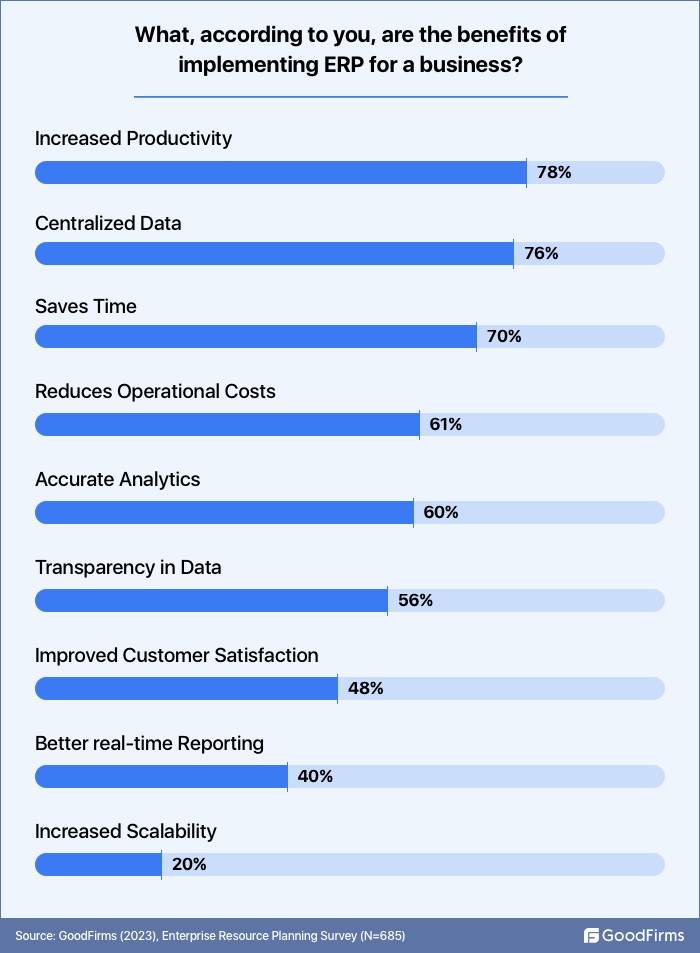
Increased Productivity
Around 78% of surveyed businesses asserted that implementing an ERP system can result in increased productivity.
ERP software is useful for centralizing the data within an organization, making it more reliable and faster for processing. With the availability of interlinked data, several departments can work in better collaboration leading to less time consumption.
Also, ERP can automate some tedious tasks that will leave more time in the hands of the employees to focus on other important aspects of the business. All this can help in achieving increased productivity and efficiency.
“The ERP system has significantly improved our company's efficiency and productivity in various ways. For instance, it has streamlined our supply chain management, allowing us to better monitor inventory levels and adjust orders as needed.”, said Daniel Chabbert, CEO and Founder of PurpleFire.
Centralized Data
Centralized data is the major advantage of implementing ERP software for 76% of the participants
ERP platforms provide an opportunity for businesses to collate their data for necessary business processes. ERP systems ensure real-time reporting of data and make them readily available for related departments.
A single source of information makes centralized data available to organizations that can make business decisions based on reliable and unaltered data. Eliminating silos by keeping data organized can improve the efficiency of the business.
Saves Time
Adoption of an ERP system saves time for about 70% of surveyees.
Automation of routine tasks can greatly reduce time consumption. Recording data and processes used for transferring the data from one place to another can be reduced significantly, reducing the labor and time required.
Saving time is an essential benefit of adopting ERP software since more quality work can be done in less time while making more scope for development possible.
Reduces Operational Costs
Around 61% of the survey participants said that ERP systems could reduce the operational costs of businesses.
The integration of business processes on a single platform, facilitated by the adoption of ERP systems, reduces the need for separate systems for individual departments. The centralization of data and decreased need for individual systems significantly reduce the operational costs of the organization.
Reliable data accessible to concerned people can also lead to less wastage, and accurate tracking of resources can help utilize resources efficiently, improving cost-effectiveness. Implementation of a sophisticated system that automates repetitive processes also reduces the requirement of employing human labor, leading to lower expenses for the company.
Accurate Analytics
60% of surveyed participants have found the implementation of ERP beneficial for accurate analytics.
Most ERP systems today come with built-in business intelligence tools. With every transaction being captured in the system, the ERP software analyzes past data to forecast the future. These analytics can be better understood with the help of graphical representation that is made available with the software.
The accuracy of these analytics is improved by technologies like data mining and machine learning. Data analysis provides a better idea of the business parameters that assist in making informed decisions. Accurate analytics can help businesses in managing inventory, sales, and finances in a better way.
Transparency in Data
Around 56% of businesses said that implementing an ERP system has helped them in achieving transparency in data.
ERP systems provide a single platform for businesses to handle all their data. With a single source of information accessible to the right people, ERP software can help improve data transparency to a great extent.
Supply chain transparency is of utmost importance for manufacturing companies that have a number of processes. With a solid ERP system in place, businesses can ensure the management of order details, shipping, and tracking information along with finances and invoicing.
The data integrity provided by these systems organizations can be sure of transparency of data that is immune to security breaches.
Enhanced Customer Satisfaction
Around 48% of businesses find ERP systems beneficial for enhanced customer satisfaction.
ERP systems help businesses streamline their backend processes resulting in the availability of accurate supply chain information. This helps inventory management and avoids a lack of stock or overstocking in the peak business period.
With better-managed inventory and supply chain, businesses can be ready to serve customers on time and with the correct products, which reduces the chances of mistakes with the logistics.
With proper supply chain data accessible to customer service representatives, the level of customer service can be improved. With the availability of customer data on hand, services provided to the customer can be personalized based on the past buying habits of the customers and their priorities.
Streamline-backend processes and huge customer data sets can enhance customer satisfaction, improving their experience.
Better Real-time Reporting
Real-time reporting is a major benefit of implementing an ERP system for about 40% of survey participants.
Making faster and more informed decisions is critical for businesses to stay relevant in the market. This can be made easy with real-time time reporting. ERP systems come with features like real-time and scheduled reporting.
These features allow businesses to have all the required reports handy as soon as the data is entered into the system. The availability of reliable and accurate information in the form of reports can assist in better decision-making. Another feature that comes with ERP systems is scheduled reporting, which automates the process of reports that are generated at certain intervals for monitoring the processes.
Improved Scalability
20% of businesses assert that ERP implementation helps in improved scalability of the business.
Implementation of ERP helps streamline business processes to enhance their efficiency. ERP software eliminates the data silos to consolidate core business processes into a single process to reduce the time-consuming and redundant processes.
With the elimination of monotonous tasks, ERP software helps businesses allocate resources more effectively and automate processes to enable them to scale without increasing the financial burden.
Challenges When Implementing ERP
Implementing any system is a crucial process. While the introduction of an ERP system can be challenging for most organizations, there are ways to tackle all the challenges. Goodirms survey gains insights into the challenges businesses face while implementing an ERP system.
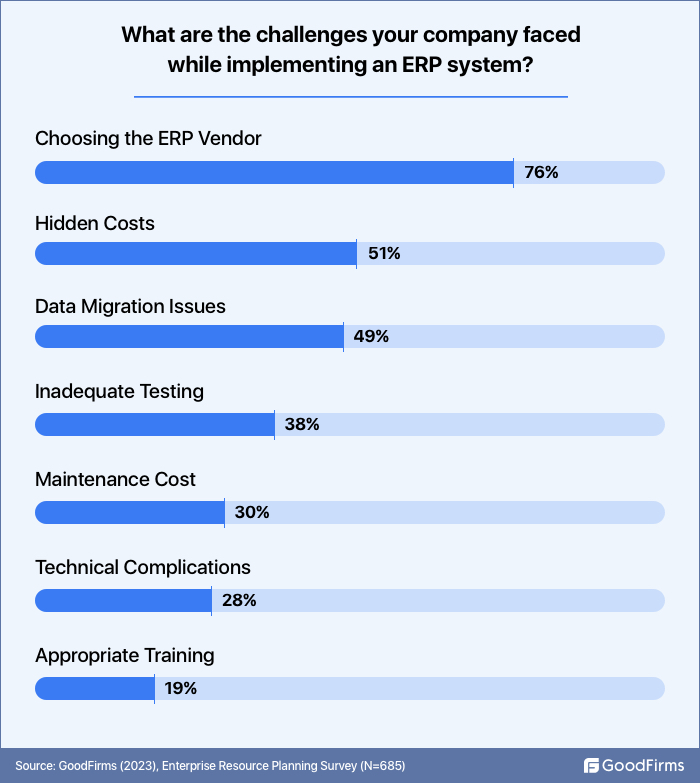
Choosing the Right Vendor
About 76% of the survey participants said that choosing the right ERP vendor was the biggest challenge when implementing ERP.
ERP software has become an essential part of the success of a business. However, the success of an ERP project depends on the proper selection of the ERP vendor.
Selecting the right vendor is essential for meeting the business requirements. Considering the huge amount of investment that is required for the ERP system, businesses must thoroughly evaluate all the potential vendors. Some of the top B2B platforms specializing in listing the top companies and products based on the original user reviews and ratings can act as a reliable way to identify the best ERP software(xx).
According to Rhett Stubbendeck, Chief Executive Officer at LeverageRx, “One of the challenges that my organization faced while implementing the ERP system was deciding which system to purchase. We had to allocate a lot of time and internal resources, so it was a very thorough process. This is very time-consuming and deteriorates the workflow of a business.”
Hidden Costs
Around 51% of businesses said that hidden costs associated with ERP implementations are a challenge.
The cost of implementation of an ERP system is often considered as the upfront cost of the hardware and software requirements. However, several other costs come with the process.
With the customizations required to fit the business requirements come the consulting and extra resources required. These factors come with additional charges. Also, processes like data migration and data cleansing incur considerable costs.
Other hidden costs include the charges of training other than the basic training provided by the vendors required for the employees. These hidden costs frequently result in cost overruns for businesses.
Data Migration Issues
Data Migration is a critical issue for 40% of the survey participants.
When implementing sophisticated ERP software, all the existing data of the organization needs to be integrated into a single platform. Data migration from the legacy systems to the new system always requires special attention.
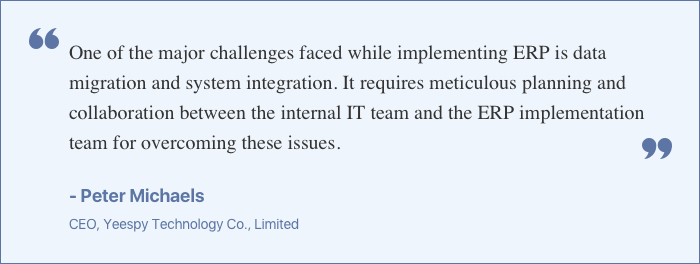
Collating the humongous amounts of data that are spread across various systems can be very challenging and time-consuming. The data might be present in several outdated systems, spreadsheets, and even on paper. Migrating the entire data to a single system without any planning might lead to duplicate or non-reliable data, which is a threat to the system implementation process.
Inadequate Testing
About 38% of the surveyees said that inadequate testing of the ERP system is a challenge for businesses.
Inadequate testing of the ERP testing can lead to issues after the software goes live. Rigorous testing of the ERP system ensures flawless integration of the legacy systems and appropriate working of the newly established system, enhancing employee convenience.
Maintenance Costs
Maintenance costs seem to be challenging for 30% of the surveyed businesses.
ERP systems require regular maintenance for their consistent performance. The maintenance of the system may incur considerable costs. Not considering the maintenance cost while implementing an ERP system can increase the financial burden on businesses.
It is also necessary to make sure that the vendor provides support in the long run to make the maintenance of the system easier.
Technical Complications
Around 28% of survey respondents said that technical complications are a major challenge when implementing ERP systems.
Technical complications may arise due to several reasons, including unsuccessful migration of data, a large number of customizations to the system, and compatibility issues between the hardware and software.
These technical complications can lead to disruption in the normal functioning of the ERP. A complete analysis of the legacy systems and a thorough study of the required functionalities of the ERP system can help in avoiding compatibility issues and also reduce the number of customizations required.
Appropriate Training
19% of the organizations said that providing appropriate training to the employees is often challenging, while ERP implementation.
Adapting to a completely new system might get difficult for the employees. Without proper and adequate training, implementation of the ERP system may lead to a decline in the productivity of the employees.
Inadequate training may also result in reluctance from the employees to use the new system. Businesses must discuss beforehand about the training provided by the vendor to its employees. It is also important to have proper documentation and knowledge transfer data for any further references.
Factors to Consider When Choosing the ERP Software
Goodfirms’ survey queried businesses about the factors that should be considered while choosing the appropriate ERP system and vendor.
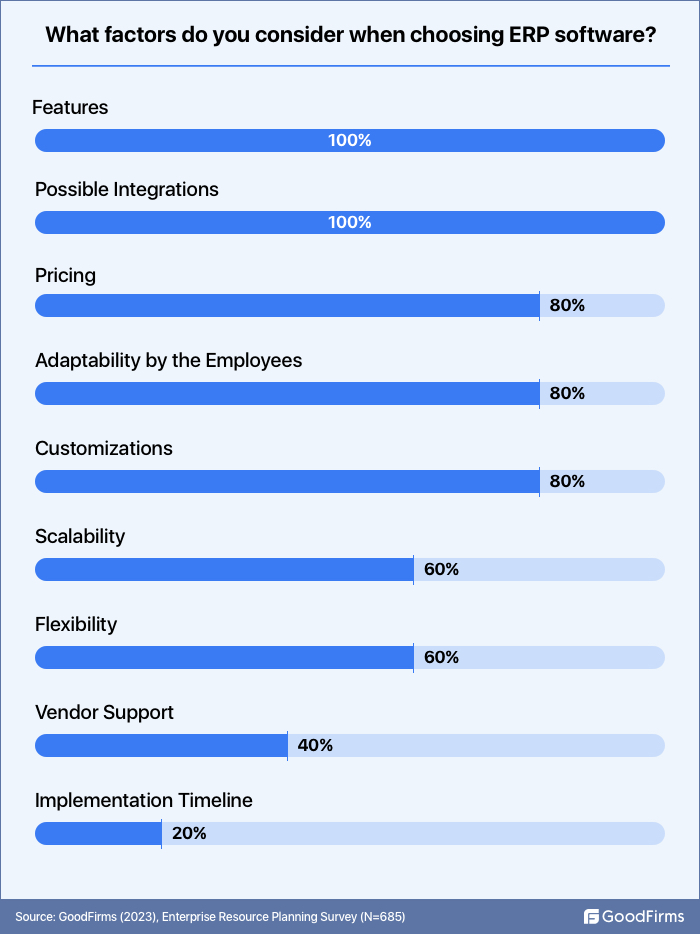
Features
All the survey participants affirmed that features offered by the ERP vendor are the deciding factor for selecting the right ERP system.
It is necessary for businesses to evaluate the features that the ERP vendor would provide. Along with the features offered by a particular ERP system, the features must fit the requirements of the business.
The features provided by the vendor must help in automating and streamlining the processes.
Possible Integrations
Integrations that are possible with a particular ERP system must be considered while choosing the right ERP vendor, according to all the survey participants.
ERP systems are meant to integrate all the business processes of the organization. However, they must also be capable of accommodating any existing systems that the business wants to continue using.
Pricing
Around 80% of the survey participants considered pricing as an important factor when deciding on ERP software to implement.
Implementing ERP software is a huge investment for any organization. When installing an ERP software, businesses have to bear all the upfront costs, including the hardware, software costs, implementation, and any customizations required.
Prices of the ownership of the ERP systems vary based on the vendor. It is necessary for businesses to set a budget for the implementation of ERP software and choose the system accordingly.
Adaptability of the Employees
Adaptability of the Employees towards the new system is considered to be an important factor for 80% of the employees.
The implementation of an ERP system requires an active involvement of the upper management of the organization. Also, the adaptability of the employees towards using a new software is also crucial for the success of the project.
Employees of the business must be willing to learn and actively get involved in the entire process and training for the system to yield the desired results.
Customizations
80% of the businesses said that customizations are a crucial factor for selecting the ERP vendor.
In order to meet the diverse requirements of several organizations, ERP systems need to be customized. It is essential to consider the customization options made available by the vendor before deciding on the appropriate system for any business.
Scalability
Scalability is a deciding factor when choosing the ERP system for 60% of the survey participants.
Every organization has certain future plans. With time, businesses have a roadmap to evolve and grow in the coming times. While selecting the right ERP system, businesses must consider a system that can accommodate the future strategy and how the ERP system can facilitate this growth.
Joosep Seitam, Co-founder and Chief Content Strategist at Adsellr said, “Businesses may have unique processes and requirements that need customization within the ERP system. Balancing customization with the system's scalability is important to avoid future limitations.”
Flexibility
While choosing an ERP system, flexibility is a criterion to be considered for 60% of the surveyed businesses.
Organizations have a roadmap for prospering in the future. Day by day, businesses scale and have newer goals. The system requirements for the organization might change in the future. It is important for businesses to be ensured of the flexibility of the ERP system to incorporate any changes in the future.
Vendor Support
Around 40% of the surveyees mentioned vendor support as a critical factor when choosing the ERP system.
With a new system installed, employees might face several issues while using it. Support from the vendor is extremely critical to tackling the challenges that arise.
Businesses must consider the support duration provided by the vendor, the level of experience of the dedicated support executives, and other related factors.
Implementation Timeline
20% of the survey respondents asserted the need to consider the implementation timeline as a factor in selecting the ERP vendor.
The duration for ERP implementation varies based on the type of the ERP system. The processes like data migration and data cleansing might require a long time. Testing the system before going live is critical as well. Businesses must, therefore, consider the time required for the implementation.
Current Trends in the ERP Industry
The ERP industry is witnessing a few interesting trends that can give a promising future to the industry. Goodfirms’ survey tries to get insights into the current trends of the ERP industry.
1) Rise in the Adoption of Cloud ERP
Traditionally, implementation of on-premise ERP was the favorite choice of businesses, and there was reluctance towards the adoption of cloud-based ERP systems. However, the picture changed due to the benefits of using cloud ERP.
There has been a rising trend of implementing cloud-based ERP software in recent years, and the trend is here to stay.
Goodfirms survey revealed that among the survey participants, around 70% of the businesses have opted for cloud-based ERP software, whereas only 10% of the businesses use on-premise ERP systems.
20% of organizations have implemented a hybrid ERP setup.
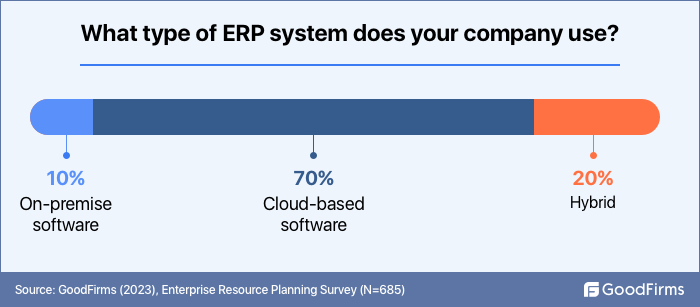
Cloud ERP systems have grown in popularity due to the several benefits they offer. Cloud ERP software is cheaper than on-premise systems. They require less hardware infrastructure to work. With a faster implementation process, cloud-based ERP systems are more secure and reliable.(4)
Cloud-based ERP systems are engineered to integrate with other technologies and thus enable easier upgrades to facilitate industries with faster growth.
The global cloud ERP market accounted for USD 40.49 billion in the year 2022 and is expected to grow up to USD 65.89 billion by the year 2027 with a CAGR of 10.7%.(5)
2) Growing Popularity of Mobile ERP
Mobility and remote working became the new normal after the pandemic. While mobile ERP has been around for a decade, it has now gained immense importance. Mobile ERP helps employees access critical information and reports in real time from anywhere to improve their operational efficiency.
The basic functioning of an ERP system depends on the data fed. The facility of working remotely offers enhanced data quality. The introduction of a mobile application by an ERP vendor can give a business a competitive edge.
Mobile ERP systems are also a great way to benefit the organization with improved agility and transparency in data.(6)
3) Integration of AI and ML
Faster and more insightful business decisions can be quite advantageous for any organization. Integration of artificial intelligence with ERP can do exactly that for a business.
Artificial intelligence can help businesses advance their business process. The seamless integration of AI and ERP can provide businesses with real-time insights and help them analyze the result and strategize their plans.
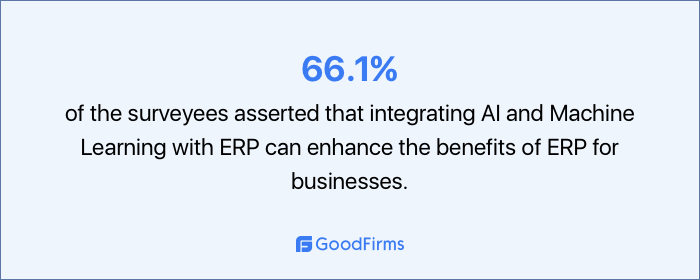
According to 66.1% of Goodfirms’ survey respondents believed that integrating AI and Machine Learning with ERP can enhance the benefits of ERP for businesses.
4) Personalized ERP
ERP platforms are a good way to improve a company’s efficiency, and personalization of the ERP can take it even further. ERP vendors offer a large range of customization options that can be a bespoke solution for a business.
Personalization of an ERP system is about getting the software accustomed to the user's working patterns and preferences and even suggesting ways the employees can improve their efficiency.
The introduction of personalization options like the No Code/Low code developments empower the users to develop the applications based on their requirements and convenience.
Low code or no code development alternatives for development provide a simplified way of enhancing the innovative ways from the employees, reducing the pressure on IT teams to customize the ERP system.(7)
5) Two-tier ERP
Working with a single ERP system can get tricky for larger organizations that have several subsidiaries and branches. To facilitate the seamless flow of data across the organization, two-tier ERP systems are gaining popularity.
Two-tier ERP allows businesses to adopt a step-up level ERP at the corporate level while adopting a tier 2 ERP solution at the subsidiary level reduces the complications of data integrity. Implementing a two-tier ERP results in a cost-effective approach to address requirements at the subsidiary level. The two-tier approach can be effective for subsidiaries to continue working efficiently while coping with the changing dynamics. (8)
6) Introduction of IoT
ERP basically works on the data fed by concerned employees. When this data is fed by intelligent devices powered by the internet, it can be done in real-time and help prompt decisions to improve business processes.
The use of smart conveyor belts and mobile scanners is a great way to monitor the quantity of goods in the warehouse. Another example of using IoT with ERP is that of sensors on the shelves of retail stores that can help with placing orders automatically, managing the inventory levels of goods, and accordingly managing the manufacturing process.
Future of the ERP Industry
The ERP industry has been thriving with the increased rate of ERP implementations. With proven benefits, especially with respect to the enhancement of productivity, the ERP industry has a bright future.
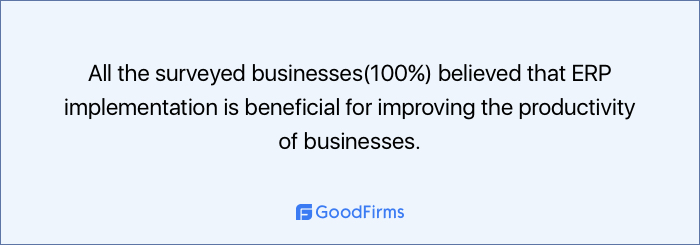
The rise in the implementation of ERP software is also expected to bring a lot of changes to the industry and the approaches from the vendors to stay competitive in the market.
Better User Interfaces
Ease of using any software promotes the application of the software. With the competitive market that the ERP industry has, vendors have to always be innovative to be a step ahead.
It is expected that ERP vendors will come up with more intuitive and user-friendly interfaces for the next generation of consumers. With more attractive dashboards and increased interactive platforms, ERP systems are expected to be beneficial for improved agility.
Industry-specific ERP
There were times when ERP systems were implemented as a whole. However, with time, demand grew for the implementation of customized ERP systems that fit a particular business. The implementation of only the required modules has been in existence for a long time.
The need for ERP systems that are suitable only for specific industries is growing, and vendors are working to create industry-specific ERP. (9)
The future can expect ERP systems tailored perfectly for industries keeping their challenges in mind and addressing the scalability issues as well.
Prediction and Automation
The increased use of artificial intelligence and machine learning is evident in the ERP industry. Using the past data of the organization and studying the market trends, organizations can expect ERP systems to act according to the insights found.
The future might also see ERP systems help businesses strategize their approach based on the data analysis done. Giving a competitive advantage to businesses, this can be an essential development for businesses.
Implementation of ERP by Small Businesses
Traditionally, ERP systems were meant for large businesses. With the introduction of modern ERP that comes in packages of modules, ERP can be implemented by smaller businesses as well.
The affordability of modern ERP systems and the benefits of the systems for improving productivity has led to a rise in ERP implementation for small businesses and startups as well.
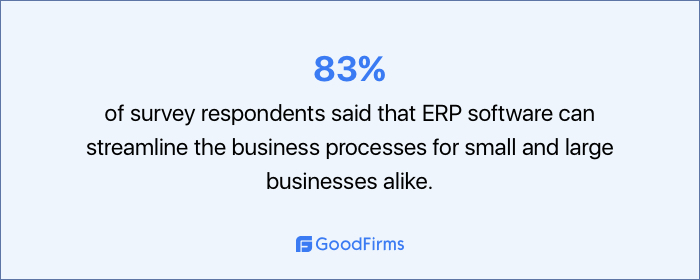
ERP systems can help small businesses in several ways to improve their performance and transparency. The trend of implementing ERP is set to grow in the coming years.
Key Findings:
-
Enterprise Resource Planning is the system used to integrate day-to-day business processes while streamlining workflows.
-
The existence of ERP can be dated back to the 1960s and was then termed Material Requirements Planning(MRP)
-
Around 60% of the surveyed businesses have already implemented an ERP system
-
For 83% of businesses, Customer Relationship Management(CRM) is the most important module
-
For 79% of the respondents. The finance module is one of the most important modules
-
Around 78% of the survey respondents said that the major benefit of implementing ERP is increased productivity
-
Centralized data is a crucial benefit of implementing an ERP system for 76% of survey participants
-
There are several factors, including features of the ERP software, possible integrations, pricing, adaptability of the employee, scalability, flexibility, vendor support, and implementation timeline, when deciding the right ERP vendor for a business.
-
Data migrations issue forms a major challenge when implementing an ERP system, according to 40% of the surveyees
-
Among the survey participants who have implemented ERP, 70% of the respondents have opted for cloud ERP
-
Mobile ERP is a growing trend in the ERP industry as it can help employees get connected to the system from anywhere, facilitating real-time access
-
The rising growth of AI and ML in the ERP sector is adding to the future growth of the ERP industry
Conclusion
With the evolution of ERP systems since its inception, the industry has grown and is expected to grow in the future as well. Several businesses have leveraged the benefits of ERP systems for their organizations.
With modernization and collaboration with several technologies, ERP systems are helping businesses on various fronts. Introduction of technologies like artificial intelligence and IoT, the benefits of ERP systems are being redefined.
Businesses must be careful about choosing the ERP vendor to have a successful implementation and reap maximum benefits for the organization. It is also necessary to tackle the risks associated with the system implementation.
With tremendous developments in the ERP sector, the industry has a great scope to grow in the future.
We sincerely thank our Research Partners for their valuable insights.
References
-
https://www.gartner.com/smarterwithgartner/understand-the-4th-era-of-erp
-
https://kodella.com/netsuite-erp/a-brief-history-of-netsuite-and-its-solutions/
-
https://www.fnfresearch.com/erp-software-market
-
https://www.technavio.com/report/cloud-erp-market-analysis?utm_source=prnewswire+&utm_medium=pressrelease&utm_campaign=latest_auto_v7_V2_wk31_2023_018_rep&utm_content=IRTNTR75878
-
https://www.thebusinessresearchcompany.com/report/cloud-based-erp-global-market-report-
-
https://www.deskera.com/in/what-is-mobile-erp
-
https://www.sap.com/india/products/technology-platform/low-code/what-is-low-code-no-code.html
-
https://www.sap.com/india/insights/top-erp-technology-trends.html
-
https://copleycg.com/why-industry-specific-erp-is-the-way-of-the-future/
Table of contents
- Introduction
- Overview of ERP
- Survey and Data Analysis:
- Around 60% of the Surveyed Businesses have Already Implemented an ERP System
- Customer Relationship Management is the Most Important ERP Module for 83% of Businesses
- Benefits of ERP
- Challenges When Implementing ERP
- Factors to Consider When Choosing the ERP Software
- Current Trends in the ERP Industry
- Future of the ERP Industry
- Key Findings:
- Conclusion
- References






